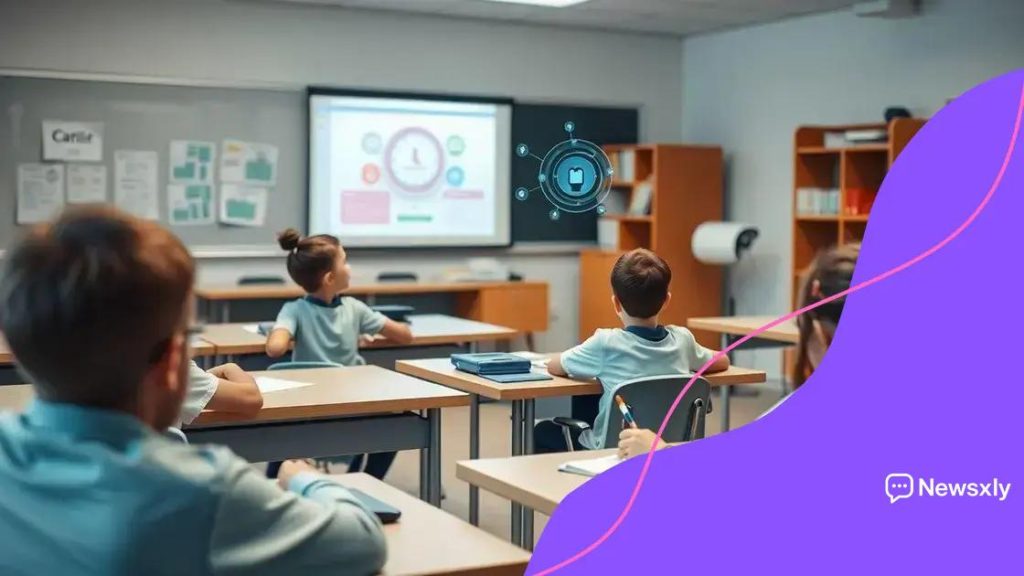The impact of AI on personalized learning

The impact of AI on personalized learning includes tailoring educational experiences to individual student needs through data analysis, enhancing engagement, and improving learning outcomes.
The impact of AI on personalized learning is significant, offering tailored educational experiences that adapt to individual student needs. Have you noticed how learning has changed with technology? Let’s explore this transformation together.
Understanding personalized learning
Understanding personalized learning is vital in today’s education landscape. It refers to tailoring learning experiences to meet individual student needs, preferences, and interests. This approach helps make learning more effective and engaging for each student.
Personalized learning can take various forms, from customized lessons to unique pacing and assessment methods. It emphasizes the importance of coaching and mentorship alongside traditional teaching methods.
The principles of personalized learning
Effective personalized learning is built on a few key principles:
- Student choice: Giving students options enhances their engagement.
- Flexible environments: Learning can happen in diverse settings, not just the classroom.
- Data-driven instruction: Using data helps teachers adjust learning strategies.
In addition to these principles, technology plays a significant role. Tools like AI assist in creating adaptive learning paths for students. This is where artificial intelligence comes into play. Through its algorithms, AI analyzes student performance and adapts content accordingly, making the learning process more dynamic.
Benefits of personalized learning
There are numerous benefits to implementing personalized learning:
- Enhanced engagement: Students are more likely to stay interested in their learning.
- Improved outcomes: Tailored strategies can lead to better academic performance.
- Increased confidence: Students feel empowered when they have a say in their education.
As education evolves, techniques like personalized learning will become crucial in helping students thrive. By embracing this approach, we can foster an environment where every learner can succeed.
How AI customizes the learning experience
How AI customizes the learning experience is a fascinating topic in modern education. By using advanced technology, educators can tailor lessons specifically to each student’s unique needs. This makes learning more effective and enjoyable.
AI systems analyze a variety of data points, such as student performance, learning speed, and preferences. This information helps create a personalized curriculum that keeps students engaged and focused. For instance, if a student struggles with math, the system can offer more practice problems tailored to their skill level.
The role of data in personalization
Data plays a crucial role in customizing education. AI algorithms review numerous factors, including:
- Test scores and grades: Understanding what students know ensures appropriate challenges.
- Learning styles: Identifying if a student learns best visually, audibly, or kinesthetically helps in developing suitable materials.
- Engagement levels: Tracking participation in class allows educators to modify their approaches.
This level of insight enables teachers to provide support where it is needed the most. For instance, if a group of students is collectively struggling with a concept, AI can notify the teacher. This insight allows for timely interventions.
Adaptive learning technologies
Many schools are adopting adaptive learning technologies powered by AI. These tools continuously adjust to fit individual student progress and learning styles. Some popular examples include:
- Intelligent tutoring systems: These offer personalized feedback and hints.
- Learning management systems: They organize and present content based on student needs.
- Gamified learning apps: These create engaging and tailored experiences.
Thus, educational institutions are discovering innovative ways to boost student success through customized learning experiences. As technology continues to evolve, the possibilities for enhancing learning will only grow.
The role of data in enhancing education

The role of data in enhancing education is becoming increasingly important. With the rise of technology, educators can use data to make informed decisions that positively impact student learning. By analyzing how students perform, schools can tailor educational strategies effectively.
Data helps identify the strengths and weaknesses of individual learners. For instance, teachers can track progress over time and see which areas need improvement. This informs instruction and allows for targeted interventions when students struggle with specific topics.
Types of data used in education
Several types of data are collected to enhance the educational experience:
- Assessment scores: Regular quizzes and tests provide insight into student understanding.
- Attendance records: Tracking attendance can reveal patterns related to academic performance.
- Engagement metrics: Monitoring classroom participation can help gauge student interest.
This data-driven approach allows schools to create customized learning experiences. For instance, if data shows that a student excels in reading but struggles in math, educators can adjust the curriculum to focus on math skills without neglecting reading.
Benefits of using data in education
Leveraging data in education offers numerous benefits for students and educators:
- Improved learning outcomes: Personalized strategies lead to better understanding and retention.
- Early intervention: Identifying at-risk students allows for timely support.
- Informed decision making: Schools can allocate resources more effectively based on data insights.
As more schools adopt data-driven methods, the potential for improving educational outcomes grows. Ultimately, the integration of data analysis into teaching practices will help create a more effective learning environment for all students.
Challenges and limitations of AI in learning
Challenges and limitations of AI in learning must be understood to implement this technology effectively in education. While AI offers numerous benefits, it also presents obstacles that educators and institutions need to address.
One significant challenge is the reliance on technology. Not all schools have equal access to resources. Economic disparities can lead to unequal learning experiences. Some students may have less exposure to advanced tools, which can widen the achievement gap.
Data privacy concerns
Another critical issue involves data privacy. The use of AI often requires collecting and analyzing student data. Parents and educators worry about how this information is stored and used. Protecting student privacy while using data to enhance learning is essential.
Technical limitations
AI’s algorithms are not perfect. They rely on the quality of the data provided. If educators feed biased or incomplete data into the system, the results may not be accurate. This can lead to incorrect assessments of student performance.
- Increased workload for teachers: Teachers must spend time learning how to integrate AI into their classrooms.
- Dependence on technology: Over-reliance on AI may reduce traditional teaching methods.
- Adoption hurdles: Some educators may resist using AI due to lack of training or unfamiliarity.
Moreover, the implementation of AI in schools can require substantial training and adjustments. Teachers must not only learn how to use the technology but also adapt their teaching methods to align with the new tools. This transition can be challenging and time-consuming, leading to resistance among some educators.
Addressing these challenges is crucial for realizing the full potential of AI in education. By acknowledging limitations and working towards solutions, we can improve the educational landscape for all students.
Future trends in AI-driven education
Future trends in AI-driven education are shaping the way we think about teaching and learning. As technology evolves, we can expect AI to play an even bigger role in how educational content is delivered.
One possible trend is the increase in personalized learning experiences. With AI, educators can create lessons that adapt to individual student needs in real-time. This means no two students will have the same learning path, helping each learner thrive based on their strengths and challenges.
Integration of virtual reality
Another exciting trend is the use of virtual reality (VR) in education. With AI and VR, students can experience immersive learning environments. For example, they could take virtual field trips to historical sites or explore the solar system. This hands-on approach makes learning more engaging and memorable.
Collaborative learning with AI
AI will also foster collaborative learning experiences. Students can work together on projects, utilizing AI tools to enhance their creativity. These collaborations can happen across different geographic locations, allowing diverse perspectives to influence learning.
- Enhanced engagement through gamification: AI will be able to create more interactive learning games that keep students motivated.
- Real-time feedback: Instant assessments will help students understand their progress and areas for improvement.
- AI-driven analytics: Teachers will use data to refine curriculums based on student performance trends.
Moreover, we can expect advancements in AI-powered tutoring systems. These systems provide personalized assistance outside the classroom, available 24/7 for students who need help. By continuing to refine AI technologies, we can create a more effective learning environment.
In summary, the future of AI in education holds promising trends that can revolutionize learning. By incorporating these advancements, we can create a richer and more inclusive educational experience for all students.
AI is transforming education in many exciting ways. It personalizes learning, allowing students to learn at their own pace. With tools like virtual reality and AI-driven tutoring systems, students can engage with material more effectively than ever before. However, it’s important to address challenges like data privacy and equal access to technology. By understanding these issues, we can shape a better future for education that benefits every student.
FAQ – Frequently Asked Questions about AI in Education
How does AI personalize learning for students?
AI analyzes individual student performance and adapts lessons to fit their unique learning styles and paces.
What are some benefits of using virtual reality in education?
Virtual reality provides immersive experiences that make learning more engaging and help students grasp complex concepts better.
Are there concerns about data privacy with AI in schools?
Yes, data privacy is a significant concern as schools must protect student information while using AI technologies.
How can teachers collaborate with AI tools?
AI tools facilitate collaboration by allowing students to work together on projects, sharing resources and ideas, regardless of location.





